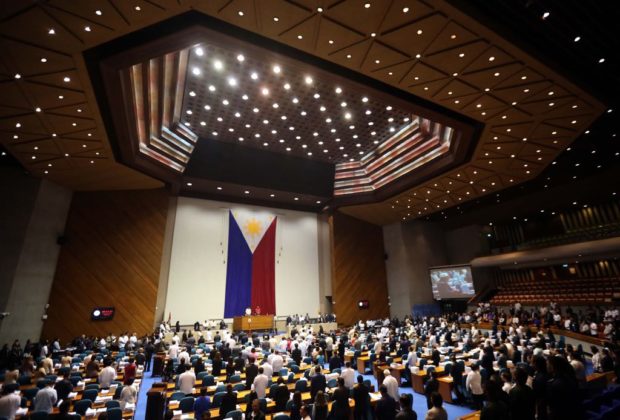Why martial law? To warn the public and allow media takeover

Congress during a deliberation of the proposal to extend martial law in Mindanao. PHOTO/Edwin Bacasmas, PDI
So, what exactly is the advantage that martial law would bring to the government’s response to security threats?
The government, aided by the military, could “theoretically” be empowered to make warrantless arrests and seizures, suppress public assembly, and take over the local media.
These would “serve as a warning to the citizenry that the President is exercising an extraordinary power with the assistance of the military,” Deputy Executive Secretary Menardo Guevarra explained during Congress’ Wednesday joint session on the extension of martial law until 2018.
“Under pain of arrest and punishment, the citizenry is advised not to make it difficult for government forces to ensure public safety,” Guevarra said, citing his interpretation of the Supreme Court’s July 2017 decision that upheld Mr. Duterte’s Proclamation No. 216.
The Palace official was responding to the query of Senator Risa Hontiveros, who wondered why the government could not just address the purported threat of Moro groups and communist rebels without imposing military rule and suspending the privilege of the writ of habeas corpus.
“What is the value added of martial law? Because of its very nature, the things that may be done by the President as commander-in-chief are likewise flexible,” Guevarra told Hontiveros.
“There could be orders pursuant to the declaration of martial law that may enable warrantless arrests or seizures, or ban public assemblies, or take over media—hypothetically speaking only, Madame Senator,” he added.
Hontiveros also questioned if there is a “standard” to determine if “public safety requires” the imposition of martial law in the event of a rebellion or invasion, as provided for by the Constitution.
Guevarra told her that “martial law is a flexible concept” and that “public safety is an abstract concept [that] does not have fixed standard.”
For him, whether there is basis to declare martial law is “all a matter of personal judgment of the executive” and “a prerogative that is exclusive to the Chief Executive.”
Hontiveros appeared bothered by Guevarra’s statements that hint at the purpose of striking fear among the populace.
Explaining her vote later to reject Mr. Duterte’s request, she said she was “shocked” by the Executive’s view, as “this is exactly the kind of thinking that plunged our country into darkness decades ago, and this is the kind of thinking that the present Constitution seeks to correct.”
“Imposing Martial Law every time there is a skirmish, or to create an illusory psychological effect, defeats the Constitutional principle that ‘civilian authority is at all times supreme over the military.'” Hontiveros said in her speech.
“And, in the hands of a government that thinks that martial law is flexible and public safety is an abstract concept, it can only be asking for trouble,” she added.
Even as she understood the need to address the “unwarranted violence of armed non-state actors,” particularly the New People’s Army, Hontiveros said President Duterte and the communist rebels should “choose peace.”
Gabriela Rep. Emmi de Jesus likewise said the “shallow and subjective definition of ‘public safety’ and ‘rebellion'” was intended for the “repression of whoever opposes the planned dictatorship.”
In an ambush interview after the extension was approved, National Security Adviser Hermogenes Esperon clarified that the “takeover of media” stated by Guevarra referred to the halt of broadcasting during combat operations.
“It’s the media in that area. It’s not the media as a whole. For one, in the Marawi operations, if it was necessary to stop transmissions during the operations, we can stop that,” Esperon said.
“In the area, you should not announce inflammatory statements or statements that are supportive of the ISIS. It’s not that there will be no media; that’s impossible,” he added.














